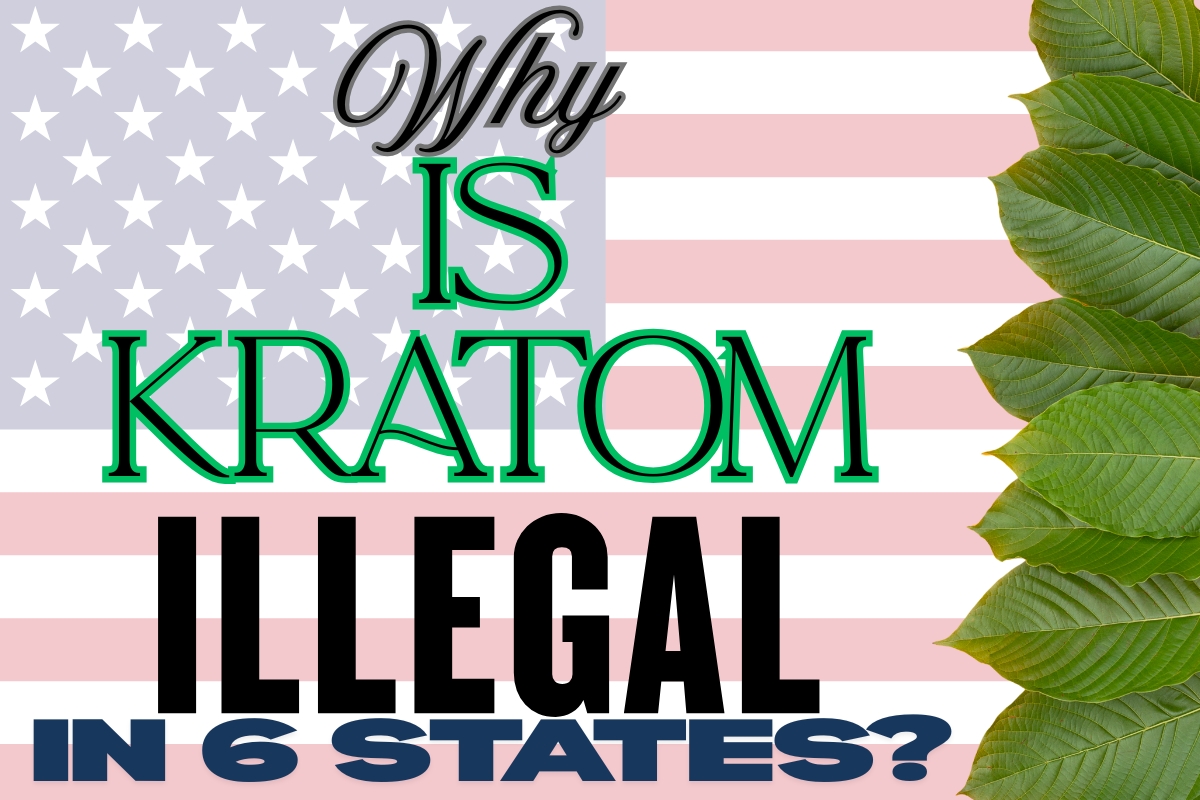The REAL Reasons Behind The Bans (2025 update)
Millions of Americans use kratom — but in six U.S. states, it’s considered a crime.
If kratom is just a natural plant in the coffee family, used by people across the country to support their well-being, then why is it banned in a handful of places?
Here’s the truth behind the bans, and what the media doesn’t want you to know. As the founder of New Hope Botanicals, I created this blog because I believe people deserve facts — not fear.
Where is Kratom Illegal in 2025?
As of September 2025, kratom is banned in:
- Indiana
- Wisconsin
- Arkansas
- Alabama
- Vermont
- Louisiana (ban took effect August 1, 2025)
But each of these bans has a different backstory. And some are already beginning to unravel.
Indiana’s Kratom Ban: A Misclassification in 2014
In 2014, Senate Bill 305 passed under the direction of Senator James Merritt, targeting synthetic drugs like bath salts. Unfortunately, kratom was wrongly included — despite being a natural, unaltered plant.
In 2023, House Bill 1500, introduced by Rep. Alan Morrison, aimed to reverse the damage by proposing age restrictions, labeling rules, and testing standards — not prohibition. While the bill didn’t pass, it showed growing momentum for change in Indiana.
Wisconsin’s Kratom Law: Built on Outdated Science
Wisconsin banned kratom in 2014 with the passage of Senate Bill 325, sponsored by Senator Sheila Harsdorf. The bill was originally aimed at outlawing synthetic and designer drugs, but kratom — a natural plant in the coffee family — was wrongly swept into the ban without scientific justification.
The law listed mitragynine and 7-hydroxymitragynine as Schedule I — the same category as heroin — without scientific review.
In 2022, a bill to legalize and regulate kratom gained the support of Speaker Robin Vos, but was ultimately blocked due to pushback from law enforcement and the Wisconsin Medical Society. Reform advocates say the battle isn’t over yet.
Arkansas, Alabama, and Vermont: Marching to the FDA’s Orders During the Panic
In 2016, Arkansas, Alabama, and Vermont all banned kratom — not based on state-level research or public hearings, but by taking marching orders from the FDA, which at the time was aggressively pressuring the DEA to schedule kratom as a dangerous substance.
But when the DEA ultimately reversed course and declined to ban kratom, these states kept their bans in place — clinging to outdated fears rather than following updated science.
Ironically, the FDA itself has since softened its stance.
In 2024, Bloomberg reported on the agency’s first official kratom study, revealing that kratom leaf appears to be safe — even at high doses — when consumed in capsule pure leaf form:
“Kratom leaves appear safe even at high doses when taken in capsule form,” Bloomberg reported.
Yet these three states haven’t caught up:
- Arkansas: In 2025, Senator Justin Boyd introduced Senate Bill 534, which passed the Senate and would have legalized and regulated kratom. But the bill was shut down in the House Public Health, Welfare, and Labor Committee after receiving a “do not pass” recommendation.
- Vermont: State lawmakers have made no effort to revisit or update the kratom ban.
- Alabama: Continues to enforce some of the harshest kratom penalties in the country, including felony trafficking charges for simple possession — even when the product was purchased legally in a neighboring state.
Louisiana Bans Kratom in 2025: What You Need to Know
Senator Jay Morris introduced Senate Bill 154, which was signed into law by Governor Jeff Landry in May 2025. The law criminalized possession and the sale of kratom which started August 1, 2025.
Despite thousands of letters and hours of expert testimony, the ban moved forward. One of the key issues was confusion among lawmakers about the difference between kratom leaf and 7-hydroxymitragynine (7-OH) products, a powerful metabolite which does not exist in the living plant, only in trace amounts in dried kratom powder.
Several lawmakers expressed concern about 7-OH without fully understanding its relationship to kratom itself — and one lawmaker even claimed, incorrectly, that there is no such thing as a “synthetic” form of kratom. She was wrong.
This inability to distinguish between natural kratom and synthetic isolates led to sweeping legislation that criminalizes the entire plant — stripping access from over 300,000 kratom consumers in Louisiana.
Advocates are already organizing lawsuits and preparing new legislation for 2026 to challenge it.
Rhode Island Legalizes Kratom: First State to Reverse a Ban
Kratom critics — and the media — love to highlight when a state bans kratom. But do they ever mention when a state overturns one?
Rhode Island banned kratom in 2017, but in 2025, it made U.S. history by becoming the first state to repeal its kratom ban — a move that received far less media attention than the original prohibition.
The credit largely goes to Speaker Pro Tempore Brian Patrick Kennedy, who sponsored House Bill 7231. In 2024, the bill passed both chambers, but Governor Dan McKee vetoed it.
Kennedy reintroduced the bill in 2025, and this time, it passed again — and was signed into law. Rhode Island now has some of the strongest kratom regulations in the nation, and its reversal sets a powerful precedent not just for legality — but for common-sense, evidence-based policy reform.
Connecticut Almost Banned Kratom Without Debate
In a sneaky legislative move, House Bill 6855 — originally a cannabis bill — was amended late in session to include kratom as a controlled substance.
The change occurred without a public hearing, and most lawmakers didn’t realize kratom was part of the bill until after it passed both chambers. Advocates are now urging Governor Ned Lamont to veto the bill due to its lack of transparency.
Real People. Real Impact.
These bans aren’t theoretical — they destroy lives:
- Marshall Price legally bought kratom in Missouri, crossed into Arkansas, and was arrested. He was murdered in jail weeks later, his daughter now travels the country advocating for kratom.
- Shaina Brown, a woman from Florida, legally purchased kratom in her home state — but unknowingly crossed into Alabama on an unmarked road just a few hundred yards from the border. There, she was arrested and charged with trafficking. She faced a $1 million bail and a 10-year mandatory sentence, all for possessing a plant that had been legal just steps away. The kratom community rallied together and raised the funds needed to get her released.
Why These Bans Are Still in Place
The real reason? Politics, fear, and outdated assumptions.
Most of these laws were passed before we had the science we do now — and before lawmakers had to face constituents who rely on kratom.
Even former New York Senator David Carlucci, who once supported a kratom ban, reversed his stance after hearing directly from the people it helped.
The Tide Is Turning
Kratom is still banned in 6 states — but the dominoes are starting to fall:
- Rhode Island just became the first to reverse its ban.
- Arkansas and Indiana came close.
- Louisiana’s ban is already under challenge.
- Connecticut isn’t finalized yet.
This fight isn’t over. If you’re in a banned state, your voice still matters — more now than ever.
📌 Want to Take Action?
- Find your state rep and send them your kratom story
- Support the American Kratom Association
- Join our newsletter for updates on legal status and advocacy campaigns
🔎 Frequently Asked Questions (FAQ)
Q: Where is kratom illegal in 2025?
A: As of October 2025, kratom is illegal in Indiana, Wisconsin, Arkansas, Alabama, Vermont, and Louisiana. Louisiana’s ban takes effect August 1, 2025.
Q: Is kratom legal in Rhode Island?
A: Yes. Rhode Island reversed its kratom ban in 2025, becoming the first state in the U.S. to do so.
Q: Why was kratom banned in some states?
A: Most bans were passed between 2014 and 2016 after pressure from the FDA, which called for federal scheduling. However, the DEA later declined to ban kratom.
Q: Has the FDA changed its position on kratom?
A: Yes. In 2024, the FDA released a study suggesting that natural kratom appears to be safe, even at high doses. They also distinguished a definitive difference between natural kratom and synthetic 7-OH.
Q: What is Senate Bill 534 in Arkansas?
A: SB 534, introduced by Senator Justin Boyd in 2025, aimed to legalize and regulate kratom. It passed the Senate but failed in the House committee.







0 Comments